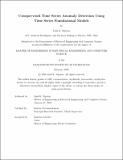Unsupervised Time Series Anomaly Detection Using Time Series Foundational Models
Author(s)
Nguyen, Linh K.
DownloadThesis PDF (3.327Mb)
Advisor
Veeramachaneni, Kalyan
Terms of use
Metadata
Show full item recordAbstract
The rapid generation of time series data across a wide array of domains—such as finance, healthcare, and industrial systems—has made anomaly detection a critical task for identifying irregular patterns that could signal significant events like fraud, system failures, or health crises. Traditional approaches to time series anomaly detection, including statistical models like ARIMA and deep learning methods, have proven effective but often require an extensive training phase, which can be both data and time-consuming. In recent years, the emergence of foundational models, including large language models (LLMs) and specialized time series models, has opened up new possibilities for anomaly detection. These models, pre-trained on vast and diverse datasets, offer the potential to perform tasks with minimal task-specific training. This thesis investigates the feasibility of leveraging these foundational models for time series anomaly detection, with the aim of determining their effectiveness in detecting anomalies without the traditional training requirements. We also aim to investigate whether foundational models pretrained specifically on time series data yield better results compared to large language models (LLMs) that were not pretrained for time series tasks.
Date issued
2025-02Department
Massachusetts Institute of Technology. Department of Electrical Engineering and Computer SciencePublisher
Massachusetts Institute of Technology